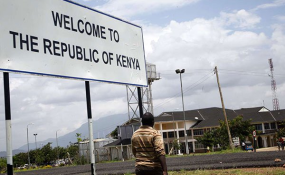 Photo: Laban Walloga/The East African
Photo: Laban Walloga/The East African
A man crosses into Kenya from Tanzania at
Taveta/Holili border post. Dar es Salaam remains opposed to issuance of
work permits to Kenyan nationals to work in its territory.
Kenya
and Tanzania are pushing to resolve their long-standing trade disputes,
which have slowed
down the flow of goods across common borders.
Trade officials
from the two countries held bilateral meetings in Arusha, in April, to
try and resolve the many contentious trade issues, including rules of
origin for some products and persistent suspicion over the quality of
products traded across the borders.
People familiar
with the negotiations told The EastAfrican that the first bilateral
meeting was held in September 2017 and the next meeting is scheduled for
Mombasa in early July.
So far the trade officials have held four bilateral meetings since 2017.
The meetings follow
a directive by the regional Heads of State in March requiring ministers
of trade and EAC affairs from Kenya and Tanzania to address and resolve
non-tariff barriers affecting trade between the two countries.
"Our trade teams
have been meeting because we need to resolve these issues amicably,"
said Kenya's Cabinet Secretary for EAC Affairs Adan Mohamed.
Kenya's Principal
Secretary in the Department of Trade Chris Kiptoo said the two countries
have managed to resolve 19 out of 37 NTBs while the ministers of trade
have made recommendations on how to resolve the remaining 18 NTBs.
Last year, Tanzania
imposed a 25 per cent import duty on Kenyan confectionery, including
juice, ice cream, chocolate, sweets and chewing gums, claiming Kenya had
used zero-rated industrial sugar imports to produce them.
Kenya banned
Tanzanian tour vans from accessing the Maasai Mara National Reserve,
arguing that Tanzania had banned Kenyan operators from accessing the
Serengeti National Park.
Tanzania escalated the trade spat in February when it imposed fresh quality verification standards for Kenyan products.
Dar said it was
merely reciprocating Kenya's decision to impose similar conditions on
goods originating from Tanzania in breach of a mutual agreement on the
standards of goods traded within the region.
Spirits and tiles
are among Tanzanian products that are subjected to quality verification
before entering Kenya even if they bear a Tanzania Bureau of Standards
quality mark.
Dar retaliated by detaining Kenyan products on its borders for more than seven days pending quality verification.
The Kenya
Association of Manufacturers said the double testing of manufactured
goods adversely affected the country's metal and automotive sectors.
The list of issues
under discussion includes Tanzania's continued restriction of free
movement of labour across its borders despite it ratifying the common
market protocol.
Dar also remains opposed to issuance of work permits to Kenyan nationals to work in its territory.
Outstanding issues
Tanzania's deputy
director in the Ministry of Foreign Affairs and East African
Co-operation Damas Haule said senior trade officials from the two
countries met at a forum organised by the East African Business Council
(EABC) to deal with the outstanding issues and remove the existing trade
barriers.
During the meeting,
EABC reportedly signed an agreement with Trade Mark East Africa (TMEA)
aimed at removing trade hurdles facing business people within the
region.
EABC's managing
director Peter Mathuki said the council would collaborate with EAC
member states to formulate a workable plan on how to remove the trade
barriers.
Intra-EAC trade
remains low at a paltry 20 per cent compared to trade within other
regional economic blocs such as the South African Development Community,
which stands at 58 per cent and the European Union at a high of 68 per
cent.
The EAC Common
Market Protocol requires member states to open up their borders to
facilitate free movement of goods, labour, services as well as capital.
Despite frequent violation of the protocol by member states there have been no consequences.
Uganda, Rwanda,
Kenya and Tanzania are currently embroiled in several trade disputes and
experts warn that unless these conflicts are resolved regional
integration will keep stalling.




No comments :
Post a Comment